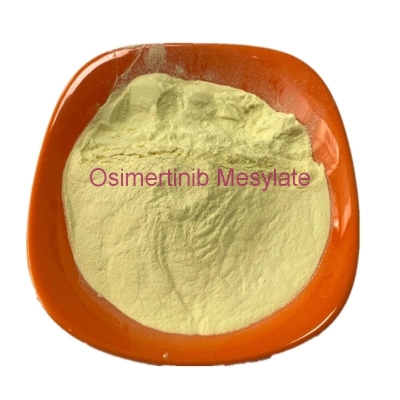-
Categories
-
Pharmaceutical Intermediates
-
Active Pharmaceutical Ingredients
-
Food Additives
- Industrial Coatings
- Agrochemicals
- Dyes and Pigments
- Surfactant
- Flavors and Fragrances
- Chemical Reagents
- Catalyst and Auxiliary
- Natural Products
- Inorganic Chemistry
-
Organic Chemistry
-
Biochemical Engineering
- Analytical Chemistry
- Cosmetic Ingredient
-
Pharmaceutical Intermediates
Promotion
ECHEMI Mall
Wholesale
Weekly Price
Exhibition
News
-
Trade Service
preface
With the continuous update and iteration of ALK-TKI, the survival of ALK-positive advanced non-small cell lung cancer (NSCLC) patients has been significantly improved
.
Among them, the new generation of ALK-TKI bugertinib has emerged with its excellent efficacy shown in studies such as ALTA-1L, and has been recommended by major authoritative guidelines
.
The 2022 ASCO Annual Meeting reported an exploratory analysis of the correlation between the depth of target lesion response and clinical outcomes in the ALTA-1L study, which showed that the proportion of patients with deep remission in the bugertinib group was as high as 56%, the median progression-free survival (mPFS) of patients in deep remission was as high as 44.
1 months, and the 4-year overall survival rate was as high as 81%, which attracted widespread clinical attention
.
In this regard, Professor Shu Yongqian of Jiangsu Provincial People's Hospital was invited to comment on the exploratory analysis results of ALTA-1L research and its guiding significance, and looked forward to the future direction of
lung cancer diagnosis and treatment.
Expert profiles
Professor Shu Yongqian
Second-level professor, chief physician, doctoral supervisor
Director of Cancer Center, Director of Oncology Department and Director of Geriatric Oncology Department of Jiangsu Provincial People's Hospital
Director of the Cancer Medical Center of the Second Affiliated Hospital of Nanjing Medical University
Vice Chairman of the Department of Colorectal Cancer Medicine of MDT Colorectal Cancer Branch of Chinese Medical Doctor Association
CSCO Governor
Vice Chairman of the CSCO Expert Committee on Oncology Cardiology
Vice Chairman of CSCO Tumor Photodynamic Expert Committee
Vice Chairman of China Biotherapeutics Professional Committee
President of the Oncology Chemotherapy and Biotherapy Physician Branch of Jiangsu Medical Association
Chairman of the Cancer Nutrition Professional Committee of Jiangsu Anti-Cancer Association
Chairman of the Tumor Recurrence and Metastasis Professional Committee of Jiangsu Anti-Cancer Association
Chairman of the Tumor Biological Diagnosis and Treatment Professional Committee of Jiangsu Biotechnology Association
Breaking the old and establishing the new: As a new efficacy evaluation index, tumor remission depth is helpful to predict the effect of drug treatment at an early stage1
Professor Shu Yongqian said that ALK mutations are often referred to as "diamond mutations", mainly because ALK-positive patients with advanced NSCLC can achieve long-term survival benefits
after ALK-TKI treatment.
As we all know, overall survival (OS) is the gold standard for the efficacy evaluation of tumor clinical trials, however, for patients with ALK-positive advanced NSCLC with long survival, the acquisition of OS results requires long-term follow-up, so in recent years, a large number of alternative OS efficacy evaluation indicators have emerged, among which tumor remission depth (DpR) has gradually entered the attention
of clinical researchers.
DpR is defined as the percentage reduction from baseline when the sum of the maximum tumor diameters after treatment is presented, and it reflects the degree of
maximum tumor withdrawal.
The predictive value of DpR in different solid tumors has been confirmed by multiple studies2-3
.
Studies have found that higher DpR is associated with longer PFS and OS in patients treated with NSCLC with ALK-TKI or PD-L1 inhibitors3
.
DpR can be used as a new efficacy evaluation index for ALK-TKI therapy, and its application helps clinical researchers to understand the anti-tumor activity
of drugs earlier.
Repeated achievements: After bugertinib treatment, more than half of patients achieve deep remission, and nearly one-quarter of patients can achieve complete remission, helping patients achieve long-term survival
In the ALTA-1L exploratory analysis disclosed by the 2022 ASCO, patients were divided into 0-50% (mild response), 51%-75% (moderate response), and 76%-100% (deep response) groups and intergroup analysis
according to the maximum proportion of target lesion reduction.
Professor Shu Yongqian introduced that the exploratory analysis results showed that after bulatinib treatment, more than half of the patients achieved deep remission, and the proportion of patients in the bugertinib group with deep remission was significantly higher than that in the crizotinib group (56% vs 34%, P=0.
0005).
At the same time, the deep remission of target lesions was closely related to better treatment outcomes of patients, and the median PFS of patients in the bulatinib group was as high as 44.
1 months, the 3-year OS rate was as high as 85%, and the 4-year OS rate was as high as 81%4, which further verified the excellent efficacy
of bugertinib in first-line treatment.
Figure 1: PFS and OS results in patients with deep remission in an exploratory analysis of the ALTA-1L study
In addition to the high deep response rate, the complete response rate of bugitinib is also very impressive
.
Professor Shu Yongqian said that the results of ALTA-1L studies showed that the objective response rate (ORR) of bugertinib was significantly higher than that of crizotinib (74% vs 62%, P=0.
033) in the overall population, and the complete response (CR) rate of bulatinib was as high as 24%5
.
It is reported that the CR rate of other ALK-TKIs is less than 10%, while bugertinib has achieved a good result of up to 24%, that is, nearly 1/4 of the target lesions have completely disappeared
.
For advanced lung cancer with high tumor burden, strong aggression and easy metastasis, chest tightness, shortness of breath and cough will be rapidly relieved
after CR is achieved.
At the same time, achieving CR may create surgical conditions for patients, and then achieve radical treatment6
.
In addition, multiple retrospective studies suggest that achieving longer survival in patients with CR translates into survival benefits7-8
.
In addition, the median duration of response (DoR) of bugertinib is close to 3 years, resulting in sustained remission
.
As a new first-line treatment option for ALK-positive advanced NSCLC, bugertinib has shown significant advantages in lesion control, achieving a higher proportion of patients in deep remission, and patients can expect
long-term survival.
It is expected that more data on the depth of remission of ALK-TKI will be released to provide a reference
for drug selection for first-line treatment.
Long obstruction: The road to exploration of lung cancer diagnosis and treatment is arduous and long
Professor Shu Yongqian said that the "Healthy China 2030" planning outline proposes that for lung tumor patients, the diagnosis and treatment of various departments should be concentrated, based on pathology and molecular biology for accurate diagnosis and staging, and then implement precision treatment
.
Nowadays, ALK-TKI has developed to "three generations in the same house", and studies have shown that the first-line use of bugertinib can quickly and deeply alleviate tumor lesions, make tumors retreat, and then patients are expected to undergo surgical resection, achieve "cure", and maximize
clinical benefits.
Although targeted therapy has made revolutionary breakthroughs, but lung cancer precision diagnosis and treatment is still a long way off, for some rare mutation patients, there is currently no targeted targeted drugs in the clinic, and new drugs for rare targets should be further developed in the future in order to achieve the goal
of increasing the overall cancer 5-year survival rate by 15% in the "Healthy China 2030" planning outline.
References:
GUO Xiaojing, CAO Nida, GU Ying, et al.
Research progress on efficacy evaluation criteria for advanced colorectal cancer[J].
World Chinese Journal of Digestion, 2014, 22(28): 4281-4287Cremolini C, Loupakis F, Antoniotti C, et al.
Early tumor shrinkage and depth of response predict long-term outcome in metastatic colorectal cancer patients treated with first-line chemotherapy plus bevacizumab: results from phase III TRIBE trial by the Gruppo Oncologico del Nord Ovest[J].
Annals of oncology, 2015, 26(6): 1188-1194.McCoach C E, Blumenthal G M, Zhang L, et al.
Exploratory analysis of the association of depth of response and survival in patients with metastatic non-small-cell lung cancer treated with a targeted therapy or immunotherapy[J].
Annals of Oncology, 2017, 28(11): 2707-2714.D.
Ross Camidge et al.
Association of depth of target lesion response to brigatinib with outcomes in patients with ALK inhibitor-naive ALK+ NSCLC in ALTA-1L[J].
2022 ASCO abstract ID:9072Camidge D R, Kim H R, Ahn M J, et al.
Brigatinib versus crizotinib in ALK inhibitor–naive advanced ALK-positive NSCLC: final results of phase 3 ALTA-1L trial[J].
Journal of Thoracic Oncology, 2021, 16(12): 2091-2108.Li K, Cao X, Ai B, et al.
Salvage surgery following downstaging of advanced non‐small cell lung cancer by targeted therapy[J].
Thoracic Cancer, 2021, 12(15): 2161-2169.Sedef A M, Calikusu Z, Bahceci A, et al.
The prognostic significance of complete response rates in patients with extensive stage small cell lung cancer[J].
2019.Kartolo A, Yeung C, Hopman W, et al.
Complete response and survival outcomes in patients with advanced cancer on immune checkpoint inhibitors[J].
Immunotherapy, 2022 (0).
Disclaimer: For information purposes only by healthcare professionals
.
Such information is not in any way a substitute for professional medical advice and should not be considered as medical advice
.
If such information is used for purposes other than understanding information, this site and the author do not assume relevant responsibility
.
Approval code: C-APROM/CN/ALUN/0359
Date of approval: October 2022
Edit: HCM
Typesetting: Uni
Execution: Traveler
END






